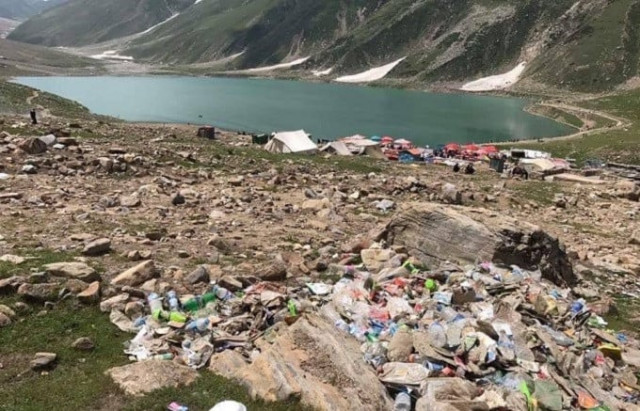Increase in tourism poses threat to natural areas
Virus related lockdowns and suspension of air travel has resulted in an upsurge of visitors to famous local spots

As access to tourist spots increases in the form of roads and affordable transport options, the resultant heavy tourist influx triggers a wave of commercial development which in turn brings pollution, deforestation, and disrupts wildlife’s natural habitat.
For instance, Kallar Kahar, home to the historic Takht-e-Babri, situated along the Islamabad-Lahore motorway, was chosen as a tourist development spot and new home to animals of the overcrowded Lahore Zoo, but for the two initiatives to happen simultaneously seems like a pipe dream.
As Naseem-ur-Rehman, Director of the Department of Environmental Protection in Punjab, puts it: “Upsurge of tourists at places like Kallar Kahar means more hotels and restaurants, more vehicles and the ultimate loser is the natural environment because of how much these development initiatives harm it.”
Naseem-ur-Rehman’s thoughts were echoed by Dr Zulfiqar Ahmed, an expert on ecotourism. Ahmed, while talking to The Express Tribune said, “The pollution problem at tourist spots is a global issue but it has become more acute in Pakistan’s context.”
Read Govt asked to promote SMEs in tourism
Ahmed is of the view that granting access to more scenic spots exacerbates the pollution problem because of the waste generated by visitors.
“Our beautiful landscapes, forests, and snow-capped peaks are losing their natural beauty with the advent of shopping bags and other junk items. The presence of these objects in forests, rivers, canals, and oceans is harming wild and marine life,” he cautioned.
The Galiyat Development Authority (GDA), which is in charge of the maintenance and upkeep of the various hill resorts in the Abbottabad district, confirmed that the amount of litter has increased.
Officials of the GDA said that several campaigns were held to curb the nuisance of littering but the overcrowding of the hill resorts, in all seasons alike, has been a major deterrent in efforts to minimize public littering. Ahsan Hameed, a GDA spokesperson, while talking to The Express Tribune, said that the authority has so far collected some Rs1.3 million under fines and penalties imposed on littering.
The country’s poster child for clean and green, according to its residents, struggles with an annoying littering problem as well.
Warda Sheikh, a lawyer based in Islamabad who hikes as an escape from her hectic routine, while talking to The Express Tribune, said, “The lockdowns increased visitor influx on hiking trails which is not a bad thing but often large groups having picnics on the trails would leave behind massive plastic waste.”
Sheikh said that she realized the situation had taken a turn for the worse when local vendors started selling plastic water bottles and juices on the trails.
Deforestation Tsunami
Apart from littering, deforestation, aided by rising tourism development, is a cause for concern in various parts of Khyber-Pakhtunkhwa (K-P). The completion of the Swat motorway has resulted in tourists visiting the area in record numbers, spurring an increase in demand for hotels.
This demand upsurge, as per General Secretary of the Khyber Pakhtunkhwa Hotel Association, Zahid Khan, has caused massive deforestation in the Kalam area. “Where there used to be lush green forests, is now brick and concrete. What use is a billion tree tsunami when the trees we plan will eventually get cut?” Khan inquired, while talking to The Express Tribune about how his hometown was fast losing its natural beauty.
Sheikh said that the construction of new restaurants and roads on the Margalla Hills had destroyed the ecosystem of the national park. “They [restaurant owners] wanted to make a profit from selling Islamabad’s green views and in doing so they have ruined the habitat of animals that reside here, especially monkeys,” she lamented. “Gone are the days when the capital used to be clean and green, now it is just a concrete jungle.”
Problem
Experts on ecotourism believe that apart from a lack of civic sense and awareness, the authorities of tourist spots did little in providing designated garbage disposal spots. “Pollution can be controlled to some extent if garbage bins are provided in every nook and cranny. We should also incentivize the recycling industry, so they can help in garbage collection from these areas,” said Dr Zulfiqar Ahmed.
Read How to promote tourism culture in Pakistan?
The Lahore-based expert on ecotourism stated that such rampant cutting down of forests all over the country would ruin the climate of these areas, which coincidentally was the reason people visited them so much in the first place.
According to Punjab Tourism Department officials, to counter the plague of deforestation in the province, efforts were being made to build hotels at some distance from tourist points so that the beauty of these places could be preserved.
With additional reporting by Ahsan Jehangir Khan from Islamabad


















COMMENTS
Comments are moderated and generally will be posted if they are on-topic and not abusive.
For more information, please see our Comments FAQ